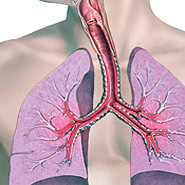
flic.kr/bXh2Ug
Asthma is a chronic inflammatory disease that makes airways (bronchial tubes) specifically sensitive to irritants, and this is characterized by difficulty in breathing.
Asthma is a highly ranked chronic health condition in adults in many western countries, and it is the leading chronic illness among children.
Asthma cannot be cured, but for most patients, it can be managed so that they have only minimal and infrequent symptoms and they can live an active life.
If you have asthma, controlling it is an important part of your life. Controlling your asthma means staying away from objects that bother your airways and taking medicines as directed by your doctor.
Some jobs can, in fact, cause asthma. Asthma caused by fumes or dust at work is called occupational asthma.
All jobs which cause asthma involve some kind of vapour, dust, or other fumes, although often the amount you breathe in is so small that people don’t expect any trouble.
The good news is that if your job is the cause of your asthma, then your asthma will disappear when you stop breathing any of the fumes or dust which caused it, provided that you and your doctors have caught and treated it early enough.
The bad news is that the longer you continue with work which causes asthma, the more likely you are to carry on having permanent asthma even if you stop the work and completely avoid the vapour, dust or fumes.
Sadly, many people go on working because no-one has noticed the connection with work, or because it seems impossible to change or leave jobs. In such instances, the penalty for your health may be very severe.
However, finding out for sure is vitally crucial for you. And, it might be vitally crucial for others as well.
Normally, when a job is the reason for someone’s asthma, there are other people with asthma for the same reason at the same workplace and in the same industry and that no-one has noticed the connection in them.
But remember, even if your kind of work has caused asthma in other people, asthma is a common disease and your asthma may just be the same type which anybody can get. This means that, it might not be work related asthma at all. Wrongly blaming your work for your asthma can have very bad effects. Why lose your job if it is not harmful and didn’t cause your asthma at all ?
If people think that the work caused asthma, the expense of enhancing working conditions may mean there will be fewer jobs or in some cases no jobs at all.
Unfortunately, a diagnosis of occupational asthma seems to turn most employers off hiring you in the future.
Alternatively, they may employ you, but under the legislation compelling them to employ some disabled persons, with two bad results. One of these is that if you no longer have asthma, you are wrongly labelled as disabled, and the other is that a job is denied to someone for whom this legislation was passed, a genuinely disabled individual.
If your asthma always seems to get better when you are on holidays or during weekends, one explanation could be that something at work is causing it. Fumes and dusts in a wide range of occupations, from working with animals to the chemical and pharmaceutical industries, and various other common trades, can cause asthma.
A number of the causes of occupational asthma are :
Animals : mammals and insects.
Some wood dusts
Epoxy resin moulding
Flour (bakery workers)
Pharmaceutical industry (some drugs)
Phthalates, e.g. in paints
Enzymes in washing detergents
Platinum refining
Plastic mouldings and polyurethane paints
Soldering (fumes from resin in soldering flux: mainly in electronics workers)
Some wood dusts
Textile dyes (reactive dyes)
Oddly enough, diesel fumes and many substances with a nasty smell don’t seem to cause asthma, even though there is vital evidence that they can cause allergic reactions in your nose.
If your asthma is due to your work, then it should be possible to eliminate the cause. The fact that you have asthma from work means that others could also get it, so the discovery could help a lot of persons — including your employer.
If the asthma is discovered early, then your work environment can be enhanced, and the asthma treated, the result of which is usually a complete cure.
However, if the occupational asthma is discovered after years of working with the offending materials, then it should get better when you no longer have breathe it in all day, but you are most likely to be left with permanent asthma, and this may be mild or severe asthma.
It is important to keep in mind that asthma is so common that most people with asthma in a workplace have it for the same reasons as everybody else, and not because of their job.
 |
Read how this person cured his asthma the natural way |
This makes it difficult to determine and discover the few people who really do have occupational asthma.
If you think that you have become affected by occupational asthma, then consult an expert on ‘Occupational Asthma’ as soon as possible.
Tagged with: asthma attack • asthma triggers
Filed under: Asthma